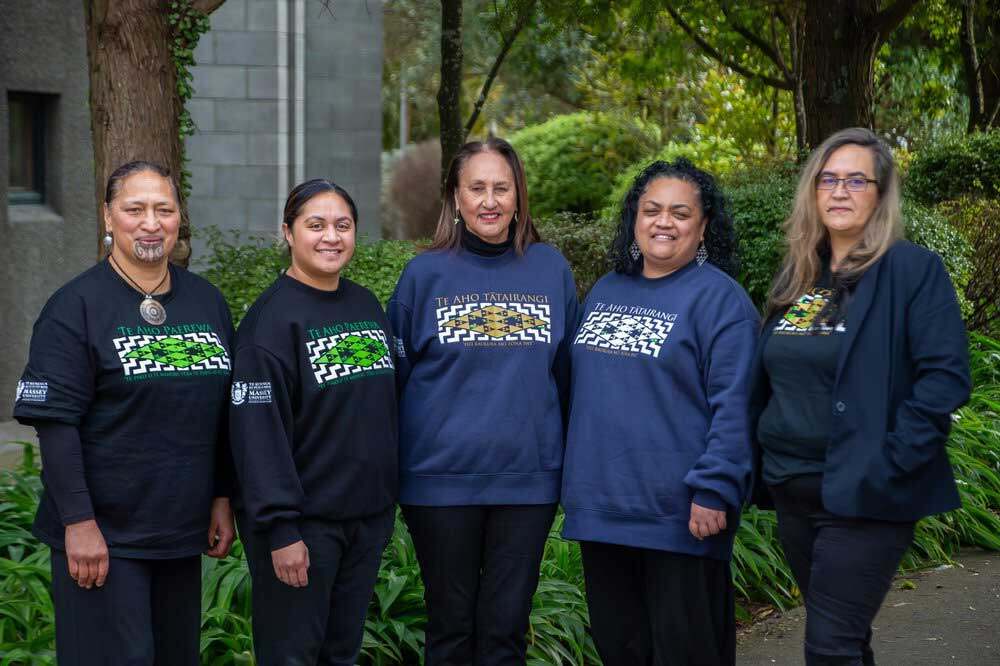The Toikura teaching unit within Te Pūtahi-a-Toi School of Māori Knowledge have been awarded the Kaupapa Māori Award at this year’s Te Whatu Kairangi Aotearoa Tertiary Educator Awards.


Te Whatu Kairangi, previously known as the Tertiary Teaching Excellence Awards, is the most recognised and respected awards programme for tertiary education and training in Aotearoa New Zealand. The awards recognise educators from all backgrounds and teaching and learning environments.
The Awards are administered by Ako Aotearoa and run annually. This year, 11 individual and group awards were given.
The Toikura teaching team consists of Senior Lecturer Mari Ropata Te Hei, Senior Lecturer Te Rina Warren, Lecturer Nadell Kokiri-Karatea, Māori Medium Facilitator Rāhera Filiata, Senior Lecturer Dr Hona Black and Professor Huia Jahnke.
Head of Te Pūtahi-a-Toi Professor Hēmi Whaanga says, “We are delighted to receive the Te Whatu Kairangi Teaching Excellence Award. It is particularly special because the award acknowledges kaupapa Māori immersion teaching at a national level.
“I’m very proud of the team because of the incredible hard work involved with immersion te reo teaching generally and within a university setting in particular. It means staff are constantly striving to develop excellence and quality in kaupapa Māori pedagogy centred in te ao Māori but cognisant of world knowledge, as well as being active in hapū, iwi and the kura kaupapa communities, all of which combined contribute to one’s personal strengths as teachers,” Professor Whaanga adds.
Toikura was established as a teaching unit within Te Pūtahi-a-Toi School of Māori Knowledge after the amalgamation of the College of Education within the College of Humanities and Social Sciences in 2013.
The teaching team draw on a long history of critical Māori education within Massey that is traced back to Palmerston North Teacher’s College and the establishment of the first institutional marae Te Kupenga o te Mātauranga.
This marae involved a number of key Māori educationalists, including Cliff Whiting, Piri Sciascia and John Tapiata who sought guidance from kaumātua such as ‘Uncle’ Mac Whakamoe, ‘Aunty’ Huia, ‘Uncle’ Bob and ‘Aunty’ Rangi Tamehana. These relationships signalled the significance of community involvement and mentorship. Most importantly, this phase developed a number of Māori teachers for the sector including Ngāti Rangitāne graduates Ataneta and Manahi Paewai.
In 1996, Palmerston North Teacher’s College transitioned into the College of Education, where Te Pōkai Rua (Diploma of Kura Kaupapa Māori) was redeveloped into Aho Tātairangi (Degree in Bi-lingual Teaching) within Te Uru Māraurau (School of Māori and Multi-cultural Education). Both the diploma and the degree programmes were centered around Te Kupenga o te Mātauranga, thereby embedding marae and community practices into the programmes.
The transition from diploma to degree involved the expertise of influential Māori educators Kahu and Mereheni Stirling and Lady (Arohia) Durie, all of whom brought a disctinct kaupapa Māori approach to pedagogical practice.
Under the leadership of Professor Jahnke, in 2009 a new partnership was formed with Te Rūnanga Nui o Ngā Kura Kaupapa Māori, the governing body for Kura Kaupapa Māori Te Aho Matua, where sector expertise assisted in co-constructing the programme to ensure that initial teacher education would meet the needs of Kura Kaupapa Māori.
An important innovation was the inclusion of Te Aho Matua (Education (Te Aho Matua) Amendment Act 1999) as the philosophical and theoretical approach to the teaching programme. The development of Te Aho Paerewa (Postgraduate Diploma Teaching Kura Kaupapa Māori) in 2017 offered a postgraduate pathway to increase the supply of Kura Kaupapa Māori teachers.
“A special facet of our pedagogy is the embedding of Te Aho Matua philosophy, the only philosophy of teaching to come from Aotearoa New Zealand, in all of our teaching courses. For this, we are grateful for our partnership with Te Rūnanga Nui o Ngā Kura Kaupapa Māori whom we acknowledge in the provision of our immersion ITE programmes at Massey. We also acknowledge all those superb lecturers who have come before us, our current students and our many outstanding graduates,” Professor Jahnke says.
College of Humanities and Social Sciences Pro Vice-Chancellor Professor Cynthia White says it is truly heartening to see this acknowledgement of the Toikura programme at Massey University through the Kaupapa Māori Award Te Whatu Kairangi.
“Since 2016 as the only university-based te reo immersion teacher education programmes in Aotearoa, the programme is committed to strengthening Māori medium and Mātauranga pathways for students. Te Kura Pūkenga Tangata the College of Humanities and Social Sciences is honoured to have Toikura as part of the work of our College. We would also like to acknowledge our partnership with Te Runanga Nui o Ngā Kura Kaupapa Māori and our Toikura graduates around the motu who continue the important work for the next generation within their communities.”
The Prime Minister’s Educator of the Year Award is the highest accolade of the event and will be awarded to one of the 11 Te Whatu Kairangi awardees at a ceremony at Parliament on 26 September.






































